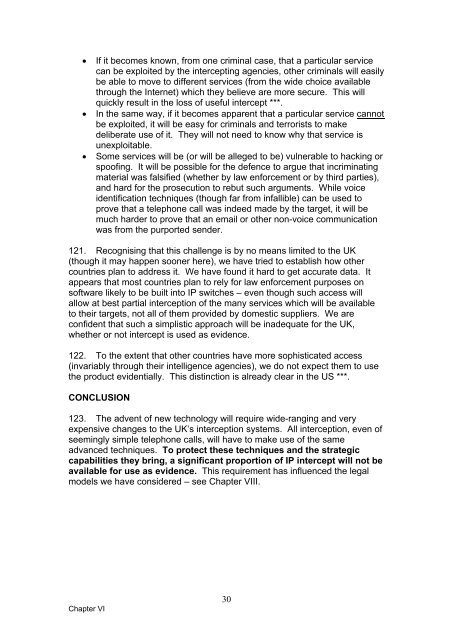Privy Council Review of intercept as evidence: report - Official ...
Privy Council Review of intercept as evidence: report - Official ...
Privy Council Review of intercept as evidence: report - Official ...
Create successful ePaper yourself
Turn your PDF publications into a flip-book with our unique Google optimized e-Paper software.
If it becomes known, from one criminal c<strong>as</strong>e, that a particular service<br />
can be exploited by the <strong>intercept</strong>ing agencies, other criminals will e<strong>as</strong>ily<br />
be able to move to different services (from the wide choice available<br />
through the Internet) which they believe are more secure. This will<br />
quickly result in the loss <strong>of</strong> useful <strong>intercept</strong> ***.<br />
In the same way, if it becomes apparent that a particular service cannot<br />
be exploited, it will be e<strong>as</strong>y for criminals and terrorists to make<br />
deliberate use <strong>of</strong> it. They will not need to know why that service is<br />
unexploitable.<br />
Some services will be (or will be alleged to be) vulnerable to hacking or<br />
spo<strong>of</strong>ing. It will be possible for the defence to argue that incriminating<br />
material w<strong>as</strong> falsified (whether by law enforcement or by third parties),<br />
and hard for the prosecution to rebut such arguments. While voice<br />
identification techniques (though far from infallible) can be used to<br />
prove that a telephone call w<strong>as</strong> indeed made by the target, it will be<br />
much harder to prove that an email or other non-voice communication<br />
w<strong>as</strong> from the purported sender.<br />
121. Recognising that this challenge is by no means limited to the UK<br />
(though it may happen sooner here), we have tried to establish how other<br />
countries plan to address it. We have found it hard to get accurate data. It<br />
appears that most countries plan to rely for law enforcement purposes on<br />
s<strong>of</strong>tware likely to be built into IP switches – even though such access will<br />
allow at best partial <strong>intercept</strong>ion <strong>of</strong> the many services which will be available<br />
to their targets, not all <strong>of</strong> them provided by domestic suppliers. We are<br />
confident that such a simplistic approach will be inadequate for the UK,<br />
whether or not <strong>intercept</strong> is used <strong>as</strong> <strong>evidence</strong>.<br />
122. To the extent that other countries have more sophisticated access<br />
(invariably through their intelligence agencies), we do not expect them to use<br />
the product evidentially. This distinction is already clear in the US ***.<br />
CONCLUSION<br />
123. The advent <strong>of</strong> new technology will require wide-ranging and very<br />
expensive changes to the UK’s <strong>intercept</strong>ion systems. All <strong>intercept</strong>ion, even <strong>of</strong><br />
seemingly simple telephone calls, will have to make use <strong>of</strong> the same<br />
advanced techniques. To protect these techniques and the strategic<br />
capabilities they bring, a significant proportion <strong>of</strong> IP <strong>intercept</strong> will not be<br />
available for use <strong>as</strong> <strong>evidence</strong>. This requirement h<strong>as</strong> influenced the legal<br />
models we have considered – see Chapter VIII.<br />
Chapter VI<br />
30
















